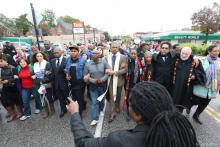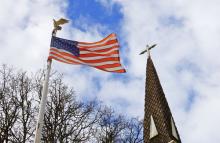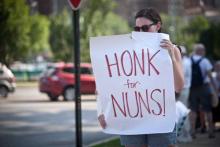st. louis

Thousands of people from around the country came to Ferguson, Mo., for a “weekend of resistance.” But for faith leaders it was a weekend of repentance. Twenty of us were arrested in Ferguson yesterday for an act of repentance.
I went to Ferguson as a faith leader but, in particular, as a white faith leader. Because the great disparity between how differently young black lives are treated in our criminal justice system than young white lives is a fundamental injustice that must not only be left to black faith leaders to raise up. Repentance must begin in the white Christian community for tolerating this offense to our black brothers and sisters and, ultimately, this offense to God. Let me be as honest as I can be. If white Christians in America were more Christian than white, black parents could feel safer about their children. It’s time for us white Christians to repent — turn around and go in a new direction.
Repentance is a powerful theme throughout the Bible. But its meaning is often not well understood. Repentance is not about being sorry or just feeling guilty. It is about turning in a new direction. The biblical word for repentance in the original Greek is metanoia, which means you are going in the wrong direction, and it’s time to turn right around.
In the case of Ferguson, repentance means more than merely acknowledging the tragic death of an unarmed 18-year-old African-African man named Michael Brown on Aug. 9 — shot and killed by a white police officer named Darren Wilson. Repentance means more than lamenting the loss of another young black man or being sympathetic to his grieving mother. True repentance means changing the direction of the practices and policies that led to his death and so many others.

In Ferguson, an unarmed black teenager was killed by police. In reaction, thousands took to the streets in protest. However, rather than attempting to listen, the heavily militarized police immediately made a show of force with armored vehicles, assault rifles, riot gear, and tear gas. People tweeted photos and videos more reminiscent of scenes from Baghdad or Fallujah than of a little Midwestern suburb in America.
Tear gas and rubber bullets were fired into the crowd of peaceful protestors. Multiple reporters were assaulted and arrested. One cop was caught on video screaming “Bring it, all you f---ing animals! Bring it!” Another appeared to be indiscriminately pointing his rifle in people’s faces and yelling “I will f---ing kill you!”
This raises the question: Is what we saw night after night in Ferguson simply a matter of a few “bad apple” cops, a local isolated problem? Or is it indicative of a wider attitude of the police in relation to the use of violence and force? Is it an anomaly, or is this what police in fact consider normal and right? In an op-ed piece in the Washington Post, a 17-year veteran of the LAPD gives us what he believes to be good advice from the perspective of a cop:
“If you don’t want to get shot, tased, pepper-sprayed, struck with a baton or thrown to the ground, just do what I tell you. Don’t argue with me ... and don’t even think of aggressively walking towards me. ”
In one sense he is of course right. If a guy has a gun at your head you should definitely not argue, and just do what he says. But one is led to ask how this reasoning is substantially different from saying to a child, “Honey, when dad is drunk and gets mad, don’t talk back, just be real quiet.” That’s probably sound advice, too, but it begs the question: Is this the world we want to live in? Is that as good as we can do?

A study came out recently saying that millennials (a category that I apparently fit into) consider ourselves the “post-racial” generation. By and large, young adults think they are the ones who have moved past racism.
Except, that’s not true. Racism is alive and well.
Here at Sojourners I’m privileged to be a part of enlightening conversations about diversity, racism, sexism, and a whole host of other injustices. This makes it all the more frustrating when I try and continue those conversations outside the Sojourners community, and I’m met with resistance. Most of my friends are extremely uncomfortable discussing race. And not just because it’s a taboo subject; this is D.C., after all, and politics are always fair game in friendly discussion. Instead, I’ve found that my friends are so unsettled by the subject that they either try and change it, or they tell me it’s not about race, it’s about income inequality. Those arguments, which I follow up with “where do you think the income inequality came from?,” are still met with resistance, and arguments that if we could just bring people out of poverty, the racial disparities would vanish.
Except they wouldn’t.

At issue was a new $100 “annual registration fee” that the city imposed on churches and nonprofits. Most of the fee will go toward building safety and fire inspections, and $25 toward administration costs.
But East St. Louis pastors say Mayor Alvin Parks is playing a game of semantics, using the word “fee” where “tax” is more accurate.
They say they only learned about the new fee when they began receiving letters from the city, warning that the churches would be turned over to a collection agency if they didn’t pay. Nonpayment, the letter said, “may reflect negatively on your credit record, lien on property and other remedies that the State of Illinois allows.”
Those building new churches pay fees for licenses and permits, just like anyone else putting up a new structure. But churches and nonprofits don’t pay taxes.

American nuns facing a Vatican takeover of their leadership organization on Aug. 10 rejected Rome’s plans to recast the group in a more conservative mold, but declined — for now — to respond with an ultimatum that could have created an unprecedented schism between the sisters and the hierarchy.
Instead, the nuns said they wanted to pursue a negotiated solution to the showdown that has galvanized American Catholics in recent months and prompted an outpouring of support for the sisters that left the Vatican with a black eye.
The statement from the Leadership Conference of Women Religious came at the end of the LCWR’s annual assembly here and was the first formal response to the Vatican from the entire organization, which represents most of the 56,000 nuns in the U.S.
The Vatican announced in April that it was assigning a team of bishops to take control of the LCWR in order to make the organization — and by extension, most U.S. nuns — hew more closely and publicly to orthodox teachings on sexuality and theology.
Sister Pat Farrell, the outgoing president of the LCWR, on Friday read the official response that expressed the organization’s “deep disappointment” with Rome’s verdict. But the statement also said the nuns wanted to keep talking with the hierarchy in hopes of “creating more possibilities for the laity and, particularly for women, to have a voice in the church.”

Catholic sisters gathered in St. Louis for their annual assembly on Thursday intensified discussions aimed at thwarting a Vatican takeover of their group, but hanging over the meeting was an even larger existential question: Do the nuns have a future?
The viability issue is central to the dispute between Rome and the nuns that has riveted Catholics and dominated this year's meeting of the Leadership Conference of Women Religious. The steering group represents most of the 56,000 nuns in religious orders in the United States.
The Vatican announced in April that a team of bishops would take control of the LCWR in order to make the nuns hew more closely and publicly to orthodox teachings on sexuality and theology. The sisters are expected to deliver their first formal reply to the takeover on Friday.
A key justification for Rome's action was the argument that vocations to more progressive women's religious communities are in free fall: In 1965 there were 180,000 sisters in religious life, more than three times today's number. The decline is especially acute in orders that belong to the LCWR.

ST. LOUIS--Wading into sensitive church-state territory, a Missouri judge has ruled in favor of an independent-minded Catholic church that claims ownership of its property and autonomy from the Archdiocese of St. Louis.
Judge Bryan Hettenbach's 50-page ruling in favor of St. Stanislaus Kostka Catholic Church is unusual for the strong interjection of a civil court into internal church matters.
In a statement, St. Louis Archbishop Robert Carlson promised to appeal the judge's opinion "all the way to the Supreme Court."
Hettenbach was careful to point out in his ruling that civil courts have no business wading into theological or ecclesiastical issues, or interpreting church law.
But he also acknowledged that the case brought by the archdiocese had given him no choice but to grapple with the Catholic Church's internal canon laws.
St. Stanislaus' lawyers believe Hettenbach succeeded. On Thursday (March 15), Richard Scherrer, one of the church's attorneys called the judge's opinion "unassailable," and a "correct finding of law."

ST. LOUIS — The Buddha said, "I teach one thing and one thing only: suffering and the end of suffering."
The end of suffering is something that Keith Freeman -- a former drug dealer, convict, alcoholic and crack addict -- has been after for decades.
And after taking part in an intense, five-month program at the Pulitzer Foundation for the Arts that connected former prisoners and homeless veterans with ancient Buddhist artwork, Freeman thinks he may have taken a step closer to enlightenment.
The group is hosting 15 performances in the Pulitzer's galleries featuring rookie actors speaking scripts culled from their own group sessions as they wrestled with Buddhist truths and their own demons.